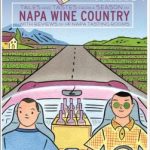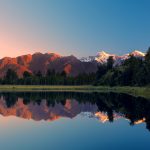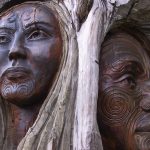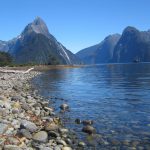 Aotearoa, the Maori name for New Zealand stayed in my head days after I inhaled its poetry, its wild forest, its volcanic lake in a caldera, the slow, gentle rhythm of its longest river, Waikato and its multi-cultural people. The North Island floated in my landscape that wanted to hear its voice during fall.
Aotearoa, the Maori name for New Zealand stayed in my head days after I inhaled its poetry, its wild forest, its volcanic lake in a caldera, the slow, gentle rhythm of its longest river, Waikato and its multi-cultural people. The North Island floated in my landscape that wanted to hear its voice during fall.
There I was introduced into the polyglot voices of the Pasifika experience of Karlo Mila, a poet who captures the essence of relationships both of the urban landscape and the island cultures that dot the South Pacific, with her first poetry book Dream Fish Floating. Yes, I resonated with her lines that speak of fear, “yes, it was a weeping wound, and for so long I’ve been afraid to let the air in.”More than fear, I celebrated with her as she brings to the table the meanings and depths of relationships, family and communal bonds, the earth and its ancestral cultures, honest rendering of the past, the continuing dialogues of races and diversity.
As we explored Auckland, her voiced weaved through one poem “Octopus Auckland”
“auckland
you feke
you octopus of a city
wrapping your tentacles around me
clinging to my skin sticking to my surfaces
leaving welts and bites
of place and location
on my body
auckland
you feke
ever changing and migrant colours
iridescent
trickster”
Karlo Mila reminded me of the thin veneer of the stories of the indigenous peoples’ experiences that lurk beneath the clean and elegant fresh modernity of Auckland. I walked through Wellesley Street and to the south end of the Karangahape Road, my mind a sponge of new experiences. I marveled the old Customhouse, the Town Hall, the Vulcan Buildings and Queens Wharf. I gazed at the Sky Tower in Victoria Street during the evening of cool, confident and moon-legend chimera that is a telecommunications and broadcasting totem looking firmly towards the horizon. I crossed by bus the Harbour Bridge with the skyline view of the city, sea, and sky-bred whose artists talk of excitement in the poetry culture that challenges those chiseled words on the concrete walls of hallowed halls. Voices of Auckland’s poetry scene “digs into the darkness”, like how the poet Jara Wasasala evokes the female body interacting with the earth and vice versa. More voices stood out from young immigrant poets as I walked and saw the places where Orewa Writers Group, Poetry Live, Inside Out Open Mic for Writers converged. I was also refreshed by the ardor of a city not imprisoned on creating architectural jungles of shadows and dark spaces. I became in love with the city, the pace and the casual rapport of people. The vibe and the song of this Southern Hemisphere city.
I sensed in the friendliness and genuineness of people that walked along the streets, the warm accommodating welcome of folks, the kindness, and hospitality that are part and inherent of the Maori culture – they call this philosophy of Manaakitanga. When, we went through the suburbs of modern wooden houses, simple and environmentally at peace with itself, I was impressed.
As we drove out of Auckland, out to other parts of the North Island, we were immersed into another Maori philosophy called Kaitiakitangawhich is a strong sense of respect and stewardship of the environment. Related to this are the concepts of mana which is spiritual power, tap which is spiritual restriction and mauri which is a spiritual force.
We came into Taupo, a town on the shore of scenic Lake Taupo whose Maori name is Taupō-nui-a-Tia. After enjoying the morning by boat in the Lake, I went bungy jumping at Lake Waikato, a 10-minute drive from the town center.
I conquered my fear. I did the adventure of life at the country’s highest water touch bungy jump which is 47 meters or 154 feet above the crystal clear Waikato River. In that moment of plunging into the void, with my feet connected to the large elastic cord, the thrill of free falling was just awesome.
I plunged, my arms outstretched feeling the wind that blew the minutest cell of my skin. I felt my fingers touch the surface of the air, soft, and dreary old wind that nourished the forest around the mountains and even the summits of Mt. Ruapehu. I felt my knees and muscles relax after initially being disoriented expecting a hard landing just a second after my feet left the platform. What a mystical communion to feel your lungs expand and contract, your heartbeats creating the most invisible of currents in the diaphragm! My eyes, my face, my nose, and my ears, in their most sentient and elemental existence, became full bird feathers directing the flow of air. I felt carried on by something both primal and imaginatively urgent.
There was nothing in my mind. All emptiness. All profound and straightforward existed simultaneously. The undefined illumined a clarity not the most novel nor ancient words can capture. There was no clutter. Just the breath of experiencing the fall, the fear gone. I was floating in a world that unchained my thoughts. All I was able to say, was a simple, thanks. I was in communion with myself. I was in closed communion with the world, the earth and water below. The air and some birds above whose were eyes focused on the clear waters of Waikato for some freshwater fish floated with me in co-existence.
My breathing from a reckless spasm of irregular intake of air and exhalation became so calm and so clean in its rhythm. The quietest of a dream, it was. Memories became clearer. There was me running with other children, there was the blue and red kite, the paper boat fast in its course around a rushing canal. There was me caught by the rain, burned by the noonday sun yet filled as if fed by the most varied of the sweetest of fruits. There was me just sleeping into the caring arms of the lullaby. There was me who fell, bruised and dirtied and able to run again so fast in the games on a full moon neem tree night.
That was the feeling of peace. That moment defied the solid boundary of time and space. There was a mystical, respectful intrusion that my mind cannot adequately process. I opened my eyes, my retina the soft bubble of pure happiness. I felt the small grasses at the bank touch the calm waters just a few seconds before I touched the water. I felt the trees, two by twos in their old stories and sanctuary nodes, oblivious and standing there saying to each other, “another body falls into the water” and kept their silence again. I knew I was on the fecund verge of hearing the terrestial movements of aphids and countless insects, the wetas which look like giant grasshoppers and blackflies. The rushing sound of steam from the geothermal area nearby and the hikers increasing their speed as they walk through the Tongariro Park became an orchestral sound for quite some time. It was soon replaced by the sound of a village from a distance, the weight of home readjusting its kitchen wares and cattle barns. There was home, waiting.
A fearless moment? A weightless episode? The harness and the rope became so relaxed.
When I finally first touched the surface of the water with my fingers, Karlo Mila’s words in her poem “Mana” came rushing,
“when you flow through my body I know I am caught in the current of a
river larger than the length of my own lifetime
it bends where we have all been before
same rapids other waters our
veins my blood
I know I am in the flow of something greater than my own self”
I bounced back, oscillated into a space where I became aware again of the vista before me. The perpetual smell of afternoon, the slow and at some points swirling flow of the Waikato River welcomed me. I became aware of the warm voice that said, “there the beauty unspoiled and the cliffs that stare eye to eye with each other like guitars being strummed by powerful hands.” I then knew that I was at the end of that experience. In that body of water with three men guiding me to the boat, I felt thirst then. What is the vocabulary of thirst at this point, I asked. Had that experience indulgently brought in me metaphorical dehydration? Paradoxical in a way, but the lines of Claude McKay, “pure water from a forest fountain first, to wash me, cleanse me, and to quench my thirst!” reminded me to drink a considerable amount of water.
I was alive, experiencing a full naked thirst. I was living and breathing. I crossed into a world of the vital and the illuminated. Aotearoa gifted me with mauri, a life force that enriched me, awakened me to my being an integral entity in the living environment. Aotearoa gifted me with the wind, the earth, the air and the water that made me grounded, humbled and integral to the essence of living. Finally, Aotearoa gifted me with a landscape so thin and crisp, yet so hopeful of a community immersed in multi-cultural diversity. The voice of Hinemoana Baker in her poem trebled deeply, as I walked back to collect my things and headed back to where I hesitated and finally faced my fear.
“the softness droops
from your forehead, shame
darkens my mouth to a
museum, to a purple
gallery of puha and paua and the sounds of these things
that keep a family well-fed and its friends
at your table in the singing summer.”





beautiful